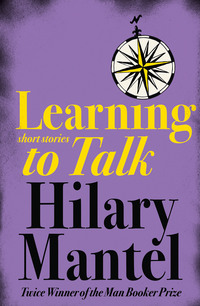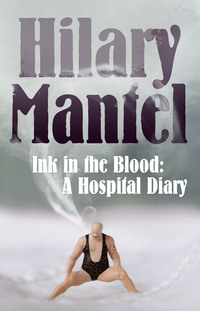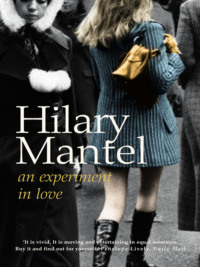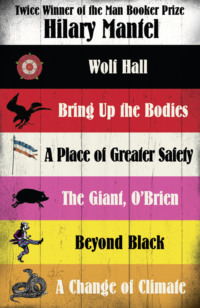
Полная версия
The Wolf Hall Trilogy
Somewhere in this maze of obligations and duties, he met Henry Sadler, and agreed to take his son into his household. ‘Teach him all you know,’ Henry proposed, a little fearfully. He arranged to collect Rafe on his way back from business in his part of the country, but he picked a bad day for it: mud and drenching rain, clouds chasing in from the coast. It was not much after two when he splashed up to the door, but the light was already failing; Henry Sadler said, can't you stay, you won't make it to London before they close the gates. I ought to try to get home tonight, he said. I have to be in court, and then there'll be my Lady Dorset's debt collectors to see off, and you know how that is … Mistress Sadler glanced fearfully outside, and down at her child: from whom she must now part, trusting him, at the age of seven, to the weather and the roads.
This is not harsh, this is usual. But Rafe was so small that he almost thought it harsh. His baby curls had been cropped and his ginger hair stood up at the crown. His mother and father knelt down and patted him. Then they swaddled and pulled and knotted him into multiple layers of over-wrapped padding, so that his slight frame swelled into the likeness of a small barrel. He looked down at the child and out at the rain and thought, sometimes I should be warm and dry like other men; how do they contrive it while I never can? Mistress Sadler knelt and took her son's face in her hands. ‘Remember everything we have told you,’ she whispered. ‘Say your prayers. Master Cromwell, please see he says his prayers.’
When she looked up he saw that her eyes were blurred with tears and he saw that the child could not bear it, and was shaking inside his vast wrappings and about to howl. He threw his cloak around himself. A scatter of raindrops flew from it, baptised the scene. ‘Well, Rafe, what do you think? If you're man enough …’ He held out his gauntleted hand. The child's hand slotted into it. ‘Shall we see how far we get?’
We'll do this fast so you don't look back, he thought. The wind and rain drove the parents back from the open door. He threw Rafe into the saddle. The rain came at them horizontally. On the outskirts of London the wind dropped. He lived at Fenchurch Street then. At the door a servant held out his arms in an offer to take Rafe, but he said, ‘We drowned men will stick together.’
The child had become a dead weight in his arms, shrinking flesh inside seven sodden layers of interwrapped wool. He stood Rafe before the fire; vapours rose from him. Roused by the warmth, he put up small frozen fingers and tentatively began to unpick, to unravel himself. What place is this, he said, in a distinct, polite tone.
‘London,’ he said. ‘Fenchurch Street. Home.’
He took a linen towel and gently blotted from his face the journey just passed. He rubbed his head. Rafe's hair stood up in spikes. Liz came in. ‘Heaven direct me: boy or hedgehog?’ Rafe turned his face to her. He smiled. He slept on his feet.
When the sweat comes back this summer, 1528, people say, as they did last year, that you won't get it if you don't think about it. But how can you not? He sends the girls out of London; first to the Stepney house, and then beyond. This time the court is infected. Henry tries to outride the plague, moving from one hunting lodge to the next. Anne is sent to Hever. The fever breaks out there among the Boleyn family and the lady's father goes down first. He lives; her sister Mary's husband dies. Anne falls ill but within twenty-four hours she is reported back on her feet. Still, it can wreck a woman's looks. You don't know what outcome to pray for, he says to the cardinal.
The cardinal says, ‘I am praying for Queen Katherine … and also for the dear Lady Anne. I am praying for King François's armies in Italy, that they may meet with success, and yet not so much success that they forget how they need their friend and ally King Henry. I am praying for the king's Majesty and all his councillors, and for the beasts in the field, and for the Holy Father and the Curia, may their decisions be guided from above. I am praying for Martin Luther, and for all those infected with his heresy, and for all who combat him, most especially the Chancellor of the Duchy of Lancaster, our dear friend Thomas More. Against all common sense and observation, I am praying for a good harvest, and for the rain to stop. I am praying for everybody. I am praying for everything. That is what it is, to be a cardinal. Only when I say to the Lord, “Now, about Thomas Cromwell –” does God say to me, “Wolsey, what have I told you? Don't you know when to give up?”’
When the infection reaches Hampton Court, the cardinal seals himself off from the world. Only four servants are allowed to approach him. When he re-emerges, he does look as if he has been praying.
At the end of the summer, when the girls come back to London, they have grown and Grace's hair has been bleached by the sun. She is shy of him and he wonders if now she can only associate him with that night when he carried her to bed, after she had been told her mother was dead. Anne says, next summer, whatever happens, I prefer to stay with you. The sickness has left the city, but the cardinal's prayers have met with variable success. The harvest is poor; the French are losing badly in Italy and their commander has died of plague.
Autumn comes. Gregory goes back to his tutor; his reluctance is clear enough, though little about Gregory is clear to him. ‘What is it,’ he asks him, ‘what's wrong?’ The boy won't say. With other people, he is sunny and lively, but with his father guarded and polite, as if to keep a formal distance between them. He says to Johane, ‘Is Gregory frightened of me?’
Quick as a needle into canvas, she darts at him. ‘He's not a monk; has he cause?’ Then she softens. ‘Thomas, why should he be? You're a kind father; in fact, I think too much so.’
‘If he doesn't want to go back to his tutor, I could send him to Antwerp to my friend Stephen Vaughan.’
‘Gregory will never make a man of business.’
‘No.’ You can't see him beating out a deal on interest rates with one of the Fuggers' agents or some sniggering de Medici clerk. ‘So what will I do with him?’
‘I'll tell you what to do – when he is ready, marry him well. Gregory is a gentleman. Anyone can see that.’
Anne is eager to make a start with Greek. He is thinking who best to teach her, asking around. He wants someone congenial, whom he can talk to over supper, a young scholar who will live in the house. He regrets the choice of tutor he's made for his son and nephews, but he won't take them away at this point. The man is quarrelsome, and to be sure there was a sad episode when one of the boys set fire to his room, because he'd been reading in bed with a candle. ‘It wouldn't be Gregory, would it?’ he'd said, always hopeful; the master seemed to think he was treating it as a joke. And he's always sending him bills that he believes he's paid; I need a household accountant, he thinks.
He sits at his desk, piled high with drawings and plans from Ipswich and Cardinal College, with craftsmen's estimates and bills for Wolsey's planting schemes. He examines a scar in the palm of his hand; it is an old burn-mark, and it looks like a twist of rope. He thinks about Putney. He thinks about Walter. He thinks about the jittery sidestep of a skittish horse, the smell of the brewery. He thinks about the kitchen at Lambeth, and about the tow-headed boy who used to bring the eels. He remembers taking the eel-boy by the hair and dipping his head in a tub of water, and holding it under. He thinks, did I really do that? I wonder why. The cardinal's probably right, I am beyond redemption. The scar sometimes itches; it is as hard as a spur of bone. He thinks, I need an accountant. I need a Greek tutor. I need Johane, but who says I can have what I need?
He opens a letter. It is from a priest called Thomas Byrd. He is in want of money, and it seems the cardinal owes him some. He makes a note, to have it checked out and paid, then picks up the letter again. It mentions two men, two scholars, Clerke and Sumner. He knows the names. They are two of the six college men, the Oxford men who had the Lutheran books. Lock them up and reason with them, the cardinal had said. He holds the letter and glances away from it. He knows something bad is coming; its shadow moves on the wall.
He reads. Clerke and Sumner are dead. The cardinal should be told, the writer says. Having no other secure place, the Dean saw fit to shut them in the college cellars, the deep cold cellars intended for storing fish. Even in that silent place, secret, icy, the summer plague sought them out. They died in the dark and without a priest.
All summer we have prayed and not prayed hard enough. Had the cardinal simply forgotten his heretics? I must go and tell him, he thinks.
It is the first week in September. His suppressed grief becomes anger. But what can he do with anger? It also must be suppressed.
But when at last the year turns, and the cardinal says, Thomas, what shall I give you for a new-year gift?, he says, ‘Give me Little Bilney.’ And without waiting for the cardinal to answer he says, ‘My lord, he has been in the Tower for a year. The Tower would frighten anyone, but Bilney is a timid man and not strong and I am afraid he is straitly kept, and my lord, you remember Sumner and Clerke and how they died. My lord, use your power, write letters, petition the king if you must. Let him go.’
The cardinal leans back. He puts his fingertips together. ‘Thomas,’ he says. ‘My dear Thomas Cromwell. Very well. But Father Bilney must go back to Cambridge. He must give up his project of going to Rome and addressing the Pope to bring him to a right way of thinking. There are very deep vaults under the Vatican, and my arm will not be able to reach him there.’
It is at the tip of his tongue to say, ‘You could not reach into the cellars of your own college.’ But he stops himself. Heresy – his brush with it – is a little indulgence that the cardinal allows him. He is always glad to have the latest bad books filleted, and any gossip from the Steelyard, where the German merchants live. He is happy to turn over a text or two, and enjoy an after-supper debate. But for the cardinal, any contentious point must be wrapped around and around again with a fine filament of words, fine as split hairs. Any dangerous opinion must be so plumped out with laughing apologies that it is as fat and harmless as the cushions you lean on. It is true that when he was told of the deaths underground, my lord was moved to tears. ‘How could I not have known?’ he said. ‘Those fine young men!’
He cries easily in recent months, though that does not mean his tears are less genuine; and indeed now he wipes away a tear, because he knows the story: Little Bilney at Gray's Inn, the man who spoke Polish, the futile messengers, the dazed children, Elizabeth Cromwell's face set in the fixed severity of death. He leans across his desk and says, ‘Thomas, please don't despair. You still have your children. And in time you may wish to marry again.’
I am a child, he thinks, who cannot be consoled. The cardinal places his hand over his. The strange stones flicker in the light, showing their depths: a garnet like a blood bubble; a turquoise with a silver sheen; a diamond with a yellow-grey blink, like the eye of a cat.
He will never tell the cardinal about Mary Boleyn, though the impulse will arise. Wolsey might laugh, he might be scandalised. He has to smuggle him the content, without the context.
Autumn, 1528: he is at court on the cardinal's business. Mary is running towards him, her skirts lifted, showing a fine pair of green silk stockings. Is her sister Anne chasing her? He waits to see.
She stops abruptly. ‘Ah, it's you!’
He wouldn't have thought Mary knew him. She puts one hand against the panelling, catching her breath, and the other against his shoulder, as if he were just part of the wall. Mary is still dazzlingly pretty; fair, soft-featured. ‘My uncle, this morning,’ she says. ‘My uncle Norfolk. He was roaring against you. I said to my sister, who is this terrible man, and she said –’
‘He's the one who looks like a wall?’
Mary takes her hand away. She laughs, blushes, and with a little heave of her bosom tries to get her breath back.
‘What was my lord of Norfolk's complaint?’
‘Oh …’ she flaps a hand to fan herself, ‘he said, cardinals, legates, it was never merry in England when we had cardinals among us. He says the Cardinal of York is despoiling the noble houses, he says he will have all to rule himself, and the lords to be like schoolboys creeping in for a whipping. Not that you should take any notice of what I say …’
She looks fragile, breathless still: but his eyes tell her to talk. She gives a little laugh and says, ‘My brother George roared too. He said that the Cardinal of York was born in a hospital for paupers and he employs a man was born in the gutter. My lord father said, come now, my dear boy, you lose nothing if you are exact: not quite a gutter, but a brewer's yard, I believe, for he's certainly no gentleman.’ Mary takes a step back. ‘You look a gentleman. I like your grey velvet, where did you find that?’
‘Italy.’
He has been promoted, from being the wall. Mary's hand creeps back; absorbed, she strokes him. ‘Could you get me some? Though a bit sober for a woman, perhaps?’
Not for a widow, he thinks. The thought must show on his face because Mary says, ‘That's it, you see. William Carey's dead.’
He bows his head and is very correct; Mary alarms him. ‘The court misses him sadly. As you must yourself.’
A sigh. ‘He was kind. Given the circumstances.’
‘It must have been difficult for you.’
‘When the king turned his mind to Anne, he thought that, knowing how things are done in France, she might accept a … a certain position, in the court. And in his heart, as he put it. He said he would give up all other mistresses. The letters he has written, in his own hand …’
‘Really?’
The cardinal always says that you can never get the king to write a letter himself. Even to another king. Even to the Pope. Even when it might make a difference.
‘Yes, since last summer. He writes and then sometimes, where he would sign Henricus Rex …’ She takes his hand, turns up his palm, and with her forefinger traces a shape. ‘Where he should sign his name, instead he draws a heart – and he puts their initials in it. Oh, you mustn't laugh …’ She can't keep the smile off her face. ‘He says he is suffering.’
He wants to say, Mary, these letters, can you steal them for me?
‘My sister says, this is not France, and I am not a fool like you, Mary. She knows I was Henry's mistress and she sees how I'm left. And she takes a lesson from it.’
He is almost holding his breath: but she's reckless now, she will have her say.
‘I tell you, they will ride over Hell to marry. They have vowed it. Anne says she will have him and she cares not if Katherine and every Spaniard is in the sea and drowned. What Henry wants he will have, and what Anne wants she will have, and I can say that, because I know them both, who better?’ Her eyes are soft and welling with tears. ‘So that is why,’ she says, ‘why I miss William Carey, because now she is everything, and I am to be swept out after supper like the old rushes. Now I'm no one's wife, they can say anything they like to me. My father says I'm a mouth to feed and my uncle Norfolk says I'm a whore.’
As if he didn't make you one. ‘Are you short of money?’
‘Oh, yes!’ she says. ‘Yes, yes, yes, and no one has even thought about that! No one has even asked me that before. I have children. You know that. I need …’ She presses her fingers against her mouth, to stop it trembling. ‘If you saw my son … well, why do you think I called him Henry? The king would have owned him as his son, just as he has owned Richmond, but my sister forbade it. He does what she says. She means to give him a prince herself, so she doesn't want mine in his nursery.’
Reports have been sent to the cardinal: Mary Boleyn's child is a healthy boy with red-gold hair and lively appetites. She has a daughter, older, but in the context that's not so interesting, a daughter. He says, ‘What age is your son now, Lady Carey?’
‘Three in March. My girl Catherine is five.’ Again she touches her lips, in consternation. ‘I'd forgotten … your wife died. How could I forget?’ How would you even know, he wonders, but she answers him at once. ‘Anne knows everything about people who work for the cardinal. She asks questions and writes the answers in a book.’ She looks up at him. ‘And you have children?’
‘Yes … do you know, no one ever asks me that either?’ He leans one shoulder against the panelling, and she moves an inch closer, and their faces soften, perhaps, from their habitual brave distress, and into the conspiracy of the bereft. ‘I have a big boy,’ he says, ‘he's at Cambridge with a tutor. I have a little girl called Grace; she's pretty and she has fair hair, though I don't … My wife was not a beauty, and I am as you see. And I have Anne, Anne wants to learn Greek.’
‘Goodness,’ she says. ‘For a woman, you know …’
‘Yes, but she says, “Why should Thomas More's daughter have the pre-eminence?” She has such good words. And she uses them all.’
‘You like her best.’
‘Her grandmother lives with us, and my wife's sister, but it's not … for Anne it's not the best arrangement. I could send her into some other household, but then … well, her Greek … and I hardly see her as it is.’ It feels like the longest speech, unless to Wolsey, that he's made for some time. He says, ‘Your father should be providing properly for you. I'll ask the cardinal to speak to him.’ The cardinal will enjoy that, he thinks.
‘But I need a new husband. To stop them calling me names. Can the cardinal get husbands?’
‘The cardinal can do anything. What kind of husband would you like?’
She considers. ‘One who will take care of my children. One who can stand up to my family. One who doesn't die.’ She touches her fingertips together.
‘You should ask for someone young and handsome too. Don't ask, don't get.’
‘Really? I was brought up in the other tradition.’
Then you had a different upbringing from your sister, he thinks. ‘In the masque, at York Place, do you remember … were you Beauty, or Kindness?’
‘Oh …’ she smiles, ‘that must be, what, seven years ago? I don't remember. I've dressed up so many times.’
‘Of course, you are still both.’
‘That's all I used to care about. Dressing up. I remember Anne, though. She was Perseverance.’
He says, ‘Her particular virtue may be tested.’
Cardinal Campeggio came here with a brief from Rome to obstruct. Obstruct and delay. Do anything, but avoid giving judgment.
‘Anne is always writing letters, or writing in her little book. She walks up and down, up and down. When she sees my lord father she holds up a palm to him, don't dare speak … and when she sees me, she gives me a little pinch. Like …’ Mary demonstrates an airy pinch, with the fingers of her left hand. ‘Like that.’ She strokes the fingers of her right hand along her throat, till she reaches the little pulsing dip above her collarbone. ‘There,’ she says. ‘Sometimes I am bruised. She thinks to disfigure me.’
‘I'll talk to the cardinal,’ he says.
‘Do.’ She waits.
He needs to go. He has things to do.
‘I no longer want to be a Boleyn,’ she says. ‘Or a Howard. If the king would recognise my boy it would be different, but as it is I don't want any more of these masques and parties and dressing up as Virtues. They have no virtues. It's all show. If they don't want to know me, I don't want to know them. I'd rather be a beggar.’
‘Really … it doesn't have to come to that, Lady Carey.’
‘Do you know what I want? I want a husband who upsets them. I want to marry a man who frightens them.’
There is a sudden light in her blue eyes. An idea has dawned. She rests one delicate finger on the grey velvet she so admires, and says softly, ‘Don't ask, don't get.’
Thomas Howard for an uncle? Thomas Boleyn for a father? The king, in time, for a brother?
‘They'd kill you,’ he says.
He thinks he shouldn't enlarge on the statement: just let it stand as fact.
She laughs, bites her lip. ‘Of course. Of course they would. What am I thinking? Anyway, I'm grateful for what you have done already. For an interval of peace this morning – because when they're shouting about you, they're not shouting about me. One day,’ she says, ‘Anne will want to talk to you. She'll send for you and you'll be flattered. She'll have a little job for you, or she'll want some advice. So before that happens, you can have my advice. Turn around and walk the other way.’
She kisses the tip of her forefinger and touches it to his lips.
The cardinal does not need him that night, so he goes home to Austin Friars. His feeling is to put distance between himself and any Boleyns at all. There are some men, possibly, who would be fascinated by a woman who had been a mistress to two kings, but he is not one of them. He thinks about sister Anne, why she should take any interest in him; possibly she has information through what Thomas More calls ‘your evangelical fraternity’, and yet this is puzzling: the Boleyns don't seem like a family who think much about their souls. Uncle Norfolk has priests to do that for him. He hates ideas and never reads a book. Brother George is interested in women, hunting, clothes, jewellery and tennis. Sir Thomas Boleyn, the charming diplomat, is interested only in himself.
He would like to tell somebody what occurred. There is no one he can tell, so he tells Rafe. ‘I think you imagined it,’ Rafe says severely. His pale eyes open wide at the story of the initials inside the heart, but he doesn't even smile. He confines his incredulity to the marriage proposal. ‘She must have meant something else.’
He shrugs; it's hard to see what. ‘The Duke of Norfolk would fall on us like a pack of wolves,’ Rafe says. ‘He would come round and set fire to our house.’ He shakes his head.
‘But the pinching. What remedy?’
‘Armour. Evidently,’ says Rafe.
‘It might raise questions.’
‘Nobody's looking at Mary these days.’ He adds accusingly, ‘Except you.’
With the arrival of the papal legate in London, the quasi-regal household of Anne Boleyn is broken up. The king does not want the issue confused; Cardinal Campeggio is here to deal with his qualms about his marriage to Katherine, which are quite separate, he will insist, from any feelings he may entertain about Lady Anne. She is packed off to Hever, and her sister goes with her. A rumour floats back to London, that Mary is pregnant. Rafe says, ‘Saving your presence, master, are you sure you only leaned against the wall?’ The dead husband's family says it can't be his child, and the king is denying it too. It's sad to see the alacrity with which people assume the king is lying. How does Anne like it? She'll have time to get over her sulks, while she's rusticated. ‘Mary will be pinched black and blue,’ Rafe says.
People all over town tell him the gossip, without knowing quite how interested he is. It makes him sad, it makes him dubious, it makes him wonder about the Boleyns. Everything that passed between himself and Mary he now sees, hears, differently. It makes his skin creep, to think that if he had been flattered, susceptible, if he had said yes to her, he might soon have become father to a baby that looked nothing like a Cromwell and very like a Tudor. As a trick, you must admire it. Mary may look like a doll but she's not stupid. When she ran down the gallery showing her green stockings, she had a sharp eye out for prey. To the Boleyns, other people are for using and discarding. The feelings of others mean nothing, or their reputations, their family name.
He smiles, at the thought of the Cromwells having a family name. Or any reputation to defend.
Whatever has happened, nothing comes of it. Perhaps Mary was mistaken, or the talk was simply malice; God knows, the family invite it. Perhaps there was a child, and she lost it. The story peters out, with no definite conclusion. There is no baby. It is like one of the cardinal's strange fairy tales, where nature itself is perverted and women are serpents and appear and disappear at will.









